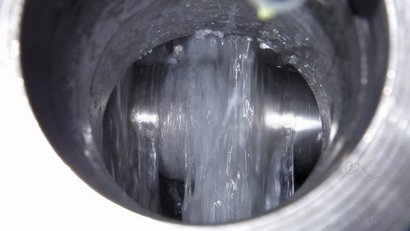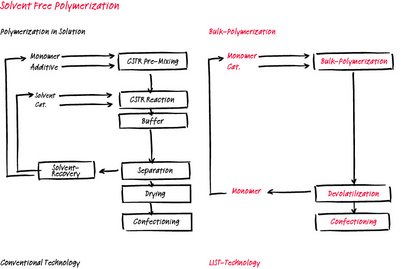Bulk Polymerization
The goal of most polymerization processes is to create a high molecular weight material with a specific structure. However, these polymerization processes are often highly exothermic and the final polymer is very viscous. The conventional production process for polymers requires large volumes of excess solvent and / or monomer to absorb the heat of reaction and to dilute the polymer to a low viscosity that can be processed. The LIST KneaderReactors are able process extremely viscous materials, while adding or removing large amounts of heat, and this makes them an ideal alternative to the conventional processes.
A typical process using LIST KneaderReactors consists of two stages:
- The first stage LIST KneaderReactor is used to polymerize the monomers and catalyts in a highly concentrated, solvent-free phase. Conversion rates of 90% … 99% can be easily reached.
- In the second stage KneaderReactor, the polymer is directly devolatilized to a residual monomer content of 1000 ppm or lower.
Especially in exothermic bulk (co)- polymerization processes, the large heat exchange surface of LIST KneaderReactors in combination with evaporative cooling helps to precisely control the product temperature.
The unique geometry of the mixing elements provides constant surface renewal which optimizes the heat transfer while minimizing product accumulation and dead zones.
Your Benefits
- Effective self-cleaning to minimize dead zones, product accumulation and product degradation
- Excellent kneading and mixing for better homogenization
- Low shear processing
- Effective heat transfer
- High surface renewal efficiency
- Large free vapour volume
- Precise and uniform temperature control due to large heat transfer areas
- Continuous processing
- Processing of sticky and highly viscous products
- Wide and flexible range of average residence times
- Wide range of possible residence time distributions (backmixed)
- Reliable process scale-up from pilot to industrial units
- High conversion rates
- Polydispersity Index 2…2.5
- Reaction at almost stoichiometric conditions
Example
Polymethyl Methacrylate (PMMA)
Bulk polymerization of Methacrylic Acid Derivates in a LIST KneaderReactor can reach a conversion rate of up to 98% and Polydispersity Index (PDI) values of 2.0 … 2.5 can be reached.
Super Absorbent Polymer (SAP)
Acrylic acid is polymerized in an aqueous bulk polymerization using a LIST KneaderReactor with a polymer content up to 45%. The precise temperature control in the LIST KneaderReactor results in a very narrow Polydispersity Index (PDI) distribution. The SAP is discharged as free flowing granular material.
Downloads
| Title | Description | Language | Year | Download |
|---|---|---|---|---|
| Reactor for solvent-free polymer processing | Converting the polymer industry to solvent-free polymerisation processes and avoiding unnecessary recirculation decreases energy consumption and reduces waste production. This can be achieved with the horizontal large-volume Kneader Reactor with superior mixing and homogenisation performance. The casing, shafts and mixing elements are indirectly heated by heat transfer fluids and dynamically self-cleaning. | English | 2012 | |
| Ganz ohne Lösungsmittel – Syntheseverfahren in der konzentrierten Phase | Mit lösemittelfreier Prozessführung, dem sogenannten Dry Processing, lassen sich zwei entscheidende Ziele erreichen: umweltfreundliche Prozesse und eine deutliche Senkung der Investitions- und Betriebskosten. Die Schweizer Firma List konzentriert sich dabei nicht auf einzelne Verfahrensschritte, sondern auf den Prozess als Einheit, um eine ganzheitliche verfahrenstechnische und wirtschaftliche Optimierung zu erreichen. | Deutsch | 2009 | |
| Es geht auch ohne Lösungsmittel | Sie suchen ein lösungsmittelfreies, sicheres, umweltfreundliches und energieeffizientes Herstellungsverfahren, das neue Produkttypen mit neuen Qualitätsmerkmalen hervorbringt? Eine neue Technologie macht’s möglich. | Deutsch | 2009 | |
| Saying goodbye to solvents | Are you looking for a solvent-free, safe, eco-friendly and energy-efficient way of producing new types of products with new levels of quality? New technology is available to help you do exactly that. | English | 2009 | |
| Prediction of Kneader Reactor Bulk Co-Polymerization Continuous Processes | Batch trials were performed on a kneader reactor where a bulk co-polymerization was carried out. Polymerization conversion, viscosity build, reaction kinetics, and heat transfer calculations were performed using the experimental data from the batch trials. A continuous process was proposed for this bulk copolymerization and the models and results from the batch trials were used in designing the continuous process. Predictions of the continuous process using the batch trial data are compared to the actual continuous process, with a focus on polymer conversion, heat transfer, and torque prediction. | English | 2007 | |
| Bulk Polymerisation or Copolymerisation in a Novel Continuous Kneader Reactor | A new type of kneader reactor is proposed for the continuous radical (co-) polymerisation without solvent, based on the proven design of mature (kneader-) dryer technology. The reactor has been developed to satisfy all major aspects required for (co-) polymerisation while maintaining the safety and reliability of the previous mechanical design. The new kneader reactor offers a perfect combination of surface renewal and evaporative cooling to control temperature to high conversion (85 to 95%), even for bulk systems that have a strong gel effect (Trommsdorff’s effect) and high exothermicity. | English | 2006 | |
| Bulk polymerisation of MMA in a kneader reactor | The bulk free radical polymerization of methyl methacrylate (MMA) or the bulk free radical copolymerization of MMA based monomer recipes face a gel effect (Trommsdorff’s effect) and exothermicity. The kneader reactor offers a perfect combination of surface renewal and evaporative cooling to control temperature at high conversion (85 to 95%). | English | 2006 | |
| Continous polymerisation | Various types of reactor have been developed to date for improving the stability of the polymerisation process. This review describes a few examples of heterogeneous and homogeneous polymerisation, focusing particularly on viscosity control and heat removal. The production of solid polymer granules directly in a kneader-reactor with evaporative cooling is one efficient and reliable polymerisation technology. | English | 2003 | |
| CKR for continous polymerisations producing solid granular polymers | A review of the existing polymerisation processes is proposed, with particular attention to the control of viscosity and heat removal. Up to the present time, different types of reactor have been developed in order to improve the stability of the polymerisation process. A review of these reactors is presented for the heterogeneous and homogeneous polymerisations. The production of solid polymer granules directly in a kneader reactor under evaporative cooling is seen as an efficient and reliable polymerisation technology. | English | 2001 |


